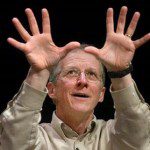Today the fragmentation of factioning may most often happen when getting words and concepts right becomes so important that I am willing to separate those who disagree with me. I put them in one class and I put myself and those who agree with me in another. When that happens, we identify ourselves and others more by our concepts and beliefs than by our having come to Christ crucified. That's a danger of theology, politics, and the rest, perhaps the chief danger.
The consequence of the divisions among the Corinthians, Paul says, is that their worship meetings are not "for the better, but for the worse" (1 Cor. 11:17). He tells the Corinthians that they destroy the meaning of the Lord's Supper, the most fundamental rite of Christian worship, by their divisions. We can assume that we too destroy our worship if we are divided by factions.
The alternative to the supremacy (and factions) of theology is life by the gifts of the Spirit (1 Cor. 12; Moro. 10). Those gifts include wisdom and knowledge, but are not limited to them, and given what Paul has said, wisdom and knowledge are probably understood differently in scripture than they are in ordinary life.
We are not unified because we agree on theological questions, even when we do. Ultimately we are not unified by our cultural practices even if we share them more or less completely. Spiritual life gives the church its unity, "that there should be no schism in the body; but that the members should have the same care one for another" (1 Cor. 12:25).
Last month, in the LDS Church's semi-annual General Conference, Bishop Gérald Caussée reminded us again of the millennia-old Pauline teaching against schisms (Eph. 2:19)—against heresy. He said:
Though the membership of the Church is increasing in its diversity, our sacred heritage transcends our differences. As members of the Church, we are admitted into the house of Israel. We become brothers and sisters, equal heirs to the same spiritual lineage. . . . In this Church there are no strangers and no outcasts. There are only brothers and sisters.
We are increasing in diversity because more and more people are joining the LDS Church from outside the areas that were traditionally our strongholds. There are Mormons now from countries all over the world. There are Mormons of different races. There are Mormons of various cultures.
But things like nationality, race, and culture are not the only ways in which our diversity increases. More and more we differ politically and socially. In North America, at least, more and more those political and social differences divide us into factions, each one holier than the other.
Would to God that we might not allow our differences to divide us, that we might not be heretics in the deepest sense of that word, that our worship might thereby be for the better rather than the worse.





